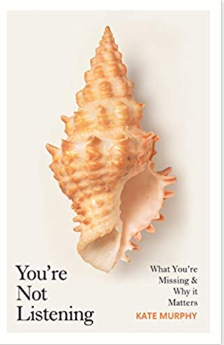
Curiosity is essential to listening


New York Times contributor Kate Murphy, reveals countless conversations she had had with everyone from priests to CIA interrogators, focus group moderators to bartenders and proves how only by listening well can we truly connect with others.
Listening has the potential to transform our relationships and our working lives improve our self-knowledge and increase our creativity and happiness.
In 2017, Facebook supremo Mark Zuckerburg said “My work is about connecting the world and giving everyone a voice. I want to personally hear more of those voices this year”.
Kate Murphy famous for her writing on health and technology argues that “digital distraction keeps the mind occupied but does little to nurture it, much less cultivate depth of feeling, which requires the resonance of another’s voice within our very bones and Psyches and leaves a creeping sense of isolation and emptiness. Listening helps you understand yourself as much as those speaking to you”.
Murphy says “listening is very different from hearing which is passive. The beat listeners focus their attention and recruit other senses to the effort. Their brains work hard to process all that incoming information and find meaning, which opens the door to creativity, empathy, insight, and knowledge. Understanding is the goal of listening and its takes effort.”
Recently, there’s been a growth in “active listening” courses for executives. However, the advice boils down to showing that you are paying attention by making eye contact, nodding and throwing in an “mmm-hmm” here and there. IN transitional listening you are encouraged not to interrupt and when the speaker finishes you are supposed to repeat or paraphrase back what the person said and then allow them to confirm or set you straight. If you are not actually interested in what the other person is saying, it is almost impossible to hear. Curiosity is essential to listening to their other half as they become convinced that they already know what they are going to say.
Businesses have tried to draw on data analysis of social media to understand customers and votes, but as the failure to predict Donald Trump’s victory and the EU referendum show, this is futile.
“Casting doubt on how accurately the sentiments expressed track what people would say in the presence of a live attentive listener”.
You’re not listening is a thought-provoking book that will help readers to think about the way they frame questions and responses to forge intimacy as Murphy puts it “ What we all want most in life is to understand and be understood”.
Listening is when someone takes a real interest in who you are, and at its most successful it offers a moment of attunement and understanding that sticks in both heads.
You’re Not Listening: What You’re Missing and Why it Matters by Kate Murphy, Harvill Secker £16.99/ Celadon $26, 288 pages.
